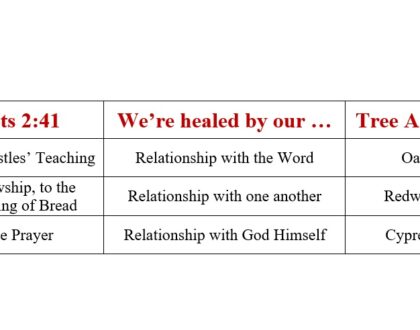Stealing Beauty from True Christian Giving

by Pastor Gene
I love the way Paul speaks to the Corinthians about their participation in the collection he was taking up for the impoverished saints in Jerusalem: “I am not saying this as a command, but I am testing the genuineness of your love …” (2 Corinthians 8:8, NET).
“I am not saying this as a command” points up the sanctity of giving as an expression of the believer’s personal walk with Jesus. As we’ve explored in an early blog, true Christian giving is a direct reflection of our gratitude for all that Jesus is and has done for us. It is the free-flowing expression of our love for Him – “I am testing the genuineness of your love,” Paul writes – and love can never be legislated.
Love is one of the fruits that the Holy Spirit grows in the life of believers who walk in the light (Galatians 5:22-23, 1 John 1:7). It is a fruit of the Spirit, not of the believer. It can’t be summoned forth as an act of the will. It is who we become as God actively transforms us into the image of His Son: for “we all … are being transformed into the same image from one degree of glory to another” (2 Corinthians 3:18).
Neon Lights in the Manger
In his wonderful book, Jesus Rediscovered (Garden City, New York: Doubleday-Galilee, 1969), Malcolm Muggeridge reflects upon a visit he made to the Church of the Nativity in Bethlehem. What he experienced there made me think of what we’ve done with Christian giving.
The Church of the Nativity was built by Constantine in A.D. 330 over a grotto that is said to be the very stable in which Jesus was born. It’s most likely the oldest existing Christian church in the world. Muggeridge, writes:
“It was somewhere here, in the neighborhood of the present-day Bethlehem, that Christ’s birth took place; on any showing, the most momentous event in the history of our Western civilization. In the exposition and portrayal of it, literally billions of words, oceans of paint, acres of canvas, mountains of stone and marble, have been expended, not to mention, in recent times, miles of film. Is there, then, anything left to say? I ask myself rather disconsolately, and decide that there is – not because of me, but because of Him . . .
Christ’s mother, Mary, conceived him out of wedlock, but believed, when an…angel, told her that her pregnancy was divinely ordained. Joseph, a poor carpenter from Nazareth, who married her, likewise understood that the child to be born to her had a special destiny in the world …
It was to this couple that Christ was born, coming into the world, as all of us do, to the accompaniment of cries of physical pain and inward spiritual ecstasy …
The place: a stable or outbuilding, a cave maybe, no other, more suitable accommodation being available or within the meager means of Mary and Joseph.
Beneath the Church of the Nativity in Bethlehem, a silver star marks the alleged precise spot where Christ was born. A stone slab nearby is supposed to mark the exact site of the manger wherein He lay.
The Holy Land is littered with such shrines . . . Most of the shrines are doubtless fraudulent, some in dubious taste, and none to my liking. Yet one may note, as the visitors come and go, ranging from the devout to the inanely curious, that almost every face somehow lights up a little.
Christ’s presence makes itself felt even in this dubious birthplace. The essential point, as I see it, about Christ’s birth is that it was so poor and so humble. The Son of God was born into the world, not as a prince, but as a pauper. So, to deck out the legendary scene of his nativity with precious hangings, pictures, glittering lamps, and other ornamentation, is to destroy whatever valid symbolism it might otherwise have …
Yet behind all this there is a real man born, growing up, reaching maturity like other men; turning his mind, as I have tried to turn mine, to what life means rather than to what it provides; trudging through this selfsame dust, and sheltering from this selfsame sun; lying down at night to sleep, and rising in the morning to live another day. I, too, have my notion of what He was like – this man in whose flesh God deigned to live and die …” (pp.19-23).
The scene that Muggeridge so aptly describes – the decking out of “the legendary” site of Jesus’ nativity with the gaudy religious accoutrements, reminds me of what we’ve done to the beautiful thing that is Christian giving: we’ve taken something sacred, something that should smack of the newness of life we have in Christ Jesus, and we’ve covered it over with gaudy religious trinkets and talismans.
All of this has served to strip Christian giving of its true spiritual beauty, retooling it into just another religious formula.
‘All the Thrill of the Circus!’
‘If you don’t tithe, you’re robbing God,’ bellows the preacher.
‘If you’ll only sow your seed generously into this ministry, God not only WILL bless you, God MUST bless you! In fact, He’s bound by His own Word to do so!’ – bellows another.
How’s that for some Big Top theology? By giving money I can actually make God do something for me! I’ve heard things like this all my Christian life.
But reframing Christian giving into a give-to-get ‘universal law of faith,’ or reducing it to a simple mathematical percentage (‘10% should do nicely’) robs the believer of something truly precious: the privilege of seeking the Holy Spirit’s leading in what he or she should give.
‘Giving-to get’ appeals to our fleshy greed. ‘Giving-to-keep-the-Law’ also appeals to the flesh, but to no avail: “For by works of the law no human being” is ever “justified in His sight” (Romans 3:20).
So, what can protect us from these ‘fleshy’ approaches to living the Christian life? Paul might suggest Galatians 5:16: “I say then: Walk in the Spirit, and you shall not fulfill the lust of the flesh.” The problem is, ‘walking in the Spirit’ is precisely what these aberrant ideas of giving keep us from!
Legalism and shell-game gimmicks always dam the flow of a vibrant, intimate walk with Jesus. Of course, the ‘tithe’ was never considered giving – the ‘offering’ was. Tithing was essentially an income tax for citizens of ancient Israel and there were three tithes, not one.
Giving, on the other hand, has always been what it is now: a reflection of the giver’s love for the One to whom he or she gives.
To put believers under the Mosaic Law – like the law of tithing, for example – is to put them under a curse: “For all who rely on the works of the law are under a curse; for it is written, ‘Cursed be everyone who does not abide by all things written in the Book of the Law, and do them.’” Thank God that Jesus has “redeemed us from the curse of the law by becoming a curse for us” (Galatians 3:10, 13, italics mine).
Greed motivation and legal obligation – to recast Christian giving in these ways is like turning the humble place of Christ’s birth into a glittering, incense-suffused spectacle that’s more Vegas carnival than Judean countryside. (See Muggeridge above, paragraph 7.)
Carnival-Barker Theology
Giving, as I see it, is God’s way of bringing us to understand that it really is “more blessed to give than to receive” – a simple truth that takes most of us a long while to learn. But, understand this: every Christian in the early church knew it! Paul attributes the words to Jesus, but they’re nowhere to be found in the Gospels. Rather, this was simply one of the ubiquitous truths that were a part of the church’s early oral tradition. “[W]e must help the weak and remember the words of the Lord Jesus, how He himself said, ‘It is more blessed to give than to receive’” (Acts 20:35).
Indeed, it is! But you won’t learn that from the give-to-get heresies of the polyester-clad, smell-the-cologne hucksters who peddle their snake oil on ‘Christian’ television.
Does anyone ever think to ask, ‘If it’s more blessed to give than to receive, then why would I give in order to receive back again? If the blessing is the giving, why would we ever want to seek the receiving?’ I’m sure I’m missing something big here, because, to me, this seems like stealing defeat from the mouth of victory.
True giving must be “cheerful,” Paul wrote, and not done “reluctantly or under compulsion,” as each giver “has decided in his heart” (2 Corinthians 9:7). But what is tithing if not compulsory? (“Will a man rob God? Yet you are robbing Me!”– Malachi 3:8a.)
True giving must be an expression of a believer’s love and gratitude for the Living God, and his or her earnest belief that it’s “more blessed to give than to receive.” But where is that to be found in the give-to-get prosperity gospel?
Coming Back to the Heart
As with all things in the Christian life, giving is about the heart. In the most important sermon the world will ever hear, Jesus said:
“If you are offering your gift at the altar and there remember that your brother has something against you, leave your gift there before the altar and go. First be reconciled to your brother, and then come and offer your gift” (Matthew 5:23-24).
It seems to me then, that through the discipline of giving, God wants to change me, to heal me, to loose my attachments to the things of the world. But this kind of change can never come through slavish legalism or the gimmicky promises of religious carnival barkers.
To make our giving about anything other love and gratitude is to hang our own shiny ornament in the humble place of Christ’s birth.
To consider
- The chorus of Matt Redman’s song, The Heart of Worship always challenges me:
I’m coming back to the heart of worship
And it’s all about You, it’s all about You, Jesus
I’m sorry, Lord, for the thing I’ve made it
When it’s all about You, it’s all about You, Jesus
Giving is certainly a part of our worship. Have you made it something that God never intended it to be?
How might you come back to the heart of worship in this area?
- Have you ever fallen into the ‘give-to-get’ gimmicks of the prosperity preachers?
Do you see how such teaching undermines the very ‘blessedness’ of giving?
How do you think this teaching might nourish our flesh rather than our spirit?
- What are your thoughts about mandated tithing?
How might it hinder the believer from seeking the Holy Spirit’s leading in this area?
What are the dangers of putting believers under this part of the Mosaic code?
- Do you feel that giving is an important part of your discipleship?
In asking us to give ‘cheerfully’ and ‘not under compulsion,’ what is the Lord trying to teach us about life?
About faith/trust?
About love and gratitude?
About freedom from attachments to worldly things?
- How might you re-think your giving as an act of worship and as a reflection of love and gratitude?
How would doing so change your experience of giving?
Recommended Posts
Comments
Comments are closed.




GOD NOS MY HEART HE NOS WHAT I CAN GIVE I GIVE BECAUSE I LOVE GOD AND THE CHUCH I DO NOT MIND GIVING
This makes me think of giving from the perspective of withholding nothing from the One who has provided all. Romans 6:13,”…present yourselves to God as those who have been brought from death to life…” reminds me of the offering that purchased my redemption. What a privilege it is to be given opportunity to enter into the Kingdom work of eternal liberty. What a picture of grace!